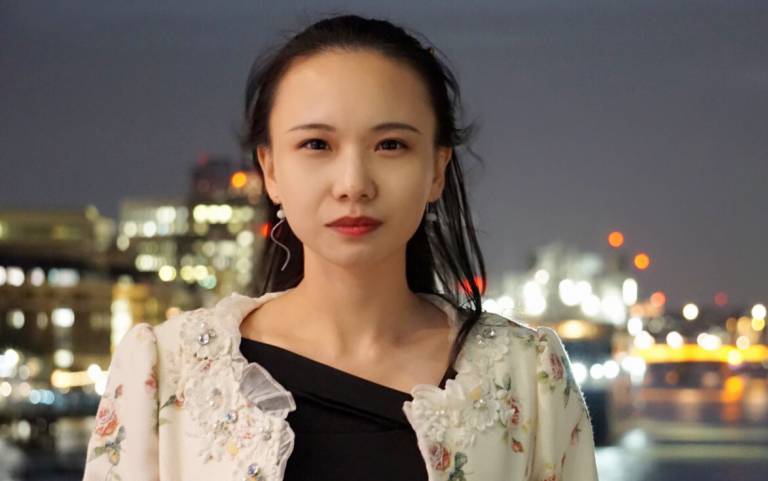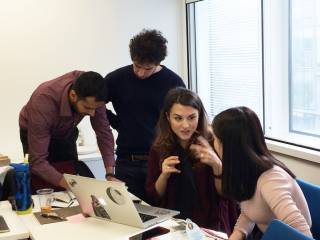Visiting PhD student Jiali Zheng awarded a Dan David Prize scholarship for climate change research
24 May 2019
PhD student Jiali Zheng has won a Dan David Prize scholarship for her research into carbon emissions and sustainable transition in China. Jiali spent a year at the Bartlett School of Construction and Project Management.

Jiali Zheng visited the School from March 2018 - March 2019 from the Chinese Academy of Sciences. She was recently awarded a prestigious Dan David Prize scholarship for her research on reducing climate change in China. The Dan David Prize awards scholarships to doctoral and post-doctoral researchers carrying out research in selected fields who show exceptional promise in their research.
We caught up with Jiali to talk about her PhD research, the importance of combatting climate change, and winning the scholarship.
Where did your dedication to reducing climate change come from?
China’s commitment at the 2015 United Nations Climate Change Conference in Paris to mitigate global climate change might be where this interest has come from.
China, the world’s largest energy consumer and carbon emitter, is at the core of global climate change mitigation and strategic low-carbon development. Given the important influence on carbon emissions, the low-carbon transition towards sustainability has become increasingly significant in China.
Tell us about your PhD research?
My PhD research focuses on carbon emissions and sustainable transition in China, which aims to analyse carbon emission patterns and explore sustainable transition pathways. This is done through constructing production-based and consumption-based CO2 emission inventories, estimating driving factors through decomposition analysis and providing policy implications and recommendations, in order to find a practical mechanism to move into a low-carbon society.
Based on construction of carbon emission inventories at global, multi-regional, national and sub-national levels, both quantitative tools and qualitative methods are used to analyse drivers and impacts of carbon emissions to propose energy-conserved, resource-efficient, environment-friendly, eco-improved, society-just and development-sustainable low-carbon transitions for China.
My PhD research focuses on China because of its extensive industrialisation and urbanisation in the past few decades. Also because the recent plateauing of CO2 emissions may indicate that decoupling economic progress from environmental degradation as a condition for sustainable development can be achieved.
What does this scholarship mean for your research?
The scholarship is awarded for a person’s current achievements and promise for the future. Therefore, in addition to the realised progress, I will continue to complete the rest of the research project with the funding. First, the project has been developing methodologies and applications to construct carbon emission inventories. Second, the project has been analysing the driving factors of changes in carbon emissions. Third, the project will explore strategies associated with low-carbon transitions.
How will your research have a positive impact on the world?
China’s CO2 emissions make up nearly a third of global emissions. Therefore international efforts to stabilise the Earth’s climate depend heavily upon the trajectory of Chinese emissions. By enhancing scientific understanding of these patterns and pathways, the research and activities in this project will jointly estimate the environmental and economic impacts of changes in carbon emissions during the ‘new normal’, a new development phase of China.
This will provide feasible and effective strategies and influence decision making to improve low-carbon transitions in China. By drawing lessons from China’s urbaniation and decarbonisation, solutions provided to reduce carbon emissions will play an important role in combatting global climate change.
Would you recommend doing a PhD?
I would highly recommend doing a PhD – and the PhD students at The Bartlett School of Construction and Project Management (BSCPM) are very motivated and well qualified. I’ve expanded my knowledge boundaries from discussions with BSCPM staff and students who all effect real-word change.
Tell us about your time at BSCPM - how did you find the experience?
My time at BSCPM was great. Particular thanks go to Dr Zhifu Mi who invited me, and to Prof D’Maris Coffman for her support, which made everything run smoothly. Researchers feel at home there and it was helpful to have other Chinese academics to discuss things with in Chinese. I would like to express my sincere gratitude to everyone in BSCPM who helped during this one-year unforgettable visit.
What do you do to relax when you’re not studying and working towards your PhD?
I really enjoy travel, and food and drink with friends – they cook, and I am only in charge of eating!
 Close
Close



